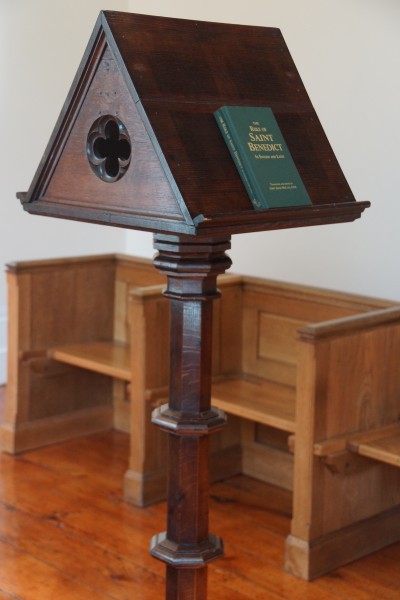Pax vera descendit

This day is the true peace come down unto us from heaven. * This day throughout the whole world the skies drop down sweetness. V. This day is the daybreak of our new redemption, of the restoring of the old, of everlasting joy. R. This day throughout the whole world the skies drop down sweetness. (Responsory at Christmas Matins)
Chapter of Faults
In preparation for the Nativity of the Lord, it is customary to hold the traditional Chapter of Faults. To some, the very name seems foreboding and negative. In reality, however, the Chapter of Faults is an experience of mercy that opens the monastic family to a renewed joy.
Pax Benedictina
In monastic communities, as in families, communication does not come easily. It is easy to live alongside others, while remaining turned–in on oneself. In many families, for example, there is but a superficial and fragile peace, a peace that is preserved by keeping secrets. “If we do not speak of it, it will go away. If we do not name it, it does not exist”. Years, and even decades can pass, without a dysfunctional family’s fears, and conflicts, and failures being acknowledged, and exorcised, and forgiven, and dismissed. Monastic families, too, can fall into a pattern of secret–keeping that is detrimental to the upbuilding of the authentic pax benedictina.
Discretion
I would not, for a minute, call into question the necessity and value of discretion. Nothing is gained by revealing all sorts of personal foibles indiscrimately. Certain things are not to be revealed except to the spiritual father. Other things are best confessed in the Sacrament Penance. In Chapter 46 of the Holy Rule, Saint Benedict recognises two sorts of faults:
If any one, while at work in the kitchen or the cellar, in serving the brethren, in the bakehouse or the garden, or at any other occupation or in any place whatever, commit any fault, or break or lose anything, or transgress in any other way, and do not come immediately before the Abbot and community, and of himself confess and make satisfaction for his fault; if it is made known by another, he shall be subjected to more severe correction. If, however, the guilt of his offence be hidden in his own soul, let him manifest it to the Abbot only, or to his spiritual seniors, who know how to heal their own wounds, and will not disclose or publish those of others.
Look First to Christ
The Chapter of Faults is something that might well be practiced in marriages and in families, as well as in the cloister. In what does the practice consist? The Chapter of Faults begins with a word of exhortation from the Prior: an invitation to lift the eyes of the soul to the adorable Face of Christ shining with every goodness and beauty. The word of the psalmist is compelling: “Thou hast set our iniquities before thy eyes: our life in the light of thy countenance” (Psalm 89:8).
An Inventory
The Prior may then help the community to consider a particular aspect of life together, for example:
Patience/Impatience;
Cheerfulness/Gloominess;
Promptness/Tardiness;
Courtesy/Rough manners;
Silence/Idle chatter and noise;
Generosity/Self–centredness;
Zeal for the sacred liturgy/Want of preparation and attention;
Obedience without delay/Footdragging;
Gentleness of manners/Harshness;
Tidiness/Carelessness;
Magnanimity/Pettiness.
Owning One’s Failures
Each member of the community is then given an opportunity to own his failings and to ask for pardon. This may be done very simply and in few words. Nothing is gained by elaborating on mistakes. “I have done such and such or left such and such undone. For this I am sorry, and ask the forgiveness and prayers of Father Prior and of each one”. End of story.
The effect of this can be extraordinary beneficial to the community. “My brother or my father is aware of his failings; he admits them; he regrets them; he has asked me for pardon and for mercy”. The mercy received from above thus begins to circulate within the monastic family. The monastery, like any Catholic family, is a place of mercy given, of mercy received, of mercy exchanged.
Beginning Afresh
Having heard each one, the Prior offers words of comfort and encouragement, and imposes on the community a particular act of penance that signifies one’s resolve to begin afresh. This may be a prayer, an action, or a combination of both. At Christmas, the penance is likely to be a visit to the crèche, whereby one can open oneself to the graces of obedience, silence, and humility that radiate from the Face and from the Heart of the Infant Christ, to the joy of the Angels, to the maternal love of the Virgin, to the contemplation of Saint Joseph, to the adoration of the shepherds. The Chapter concludes with the Prior giving the Plenary Indulgence as laid out in the Benedictine Ritual. The fruit of the Chapter of Faults? It is a joy that descends from above, a peace that the world cannot give, and the grace of beginning afresh . . . together.

Where can one read up on this Chapter of Faults? When would be the best days for applying this within the family context?
Br. Gregory